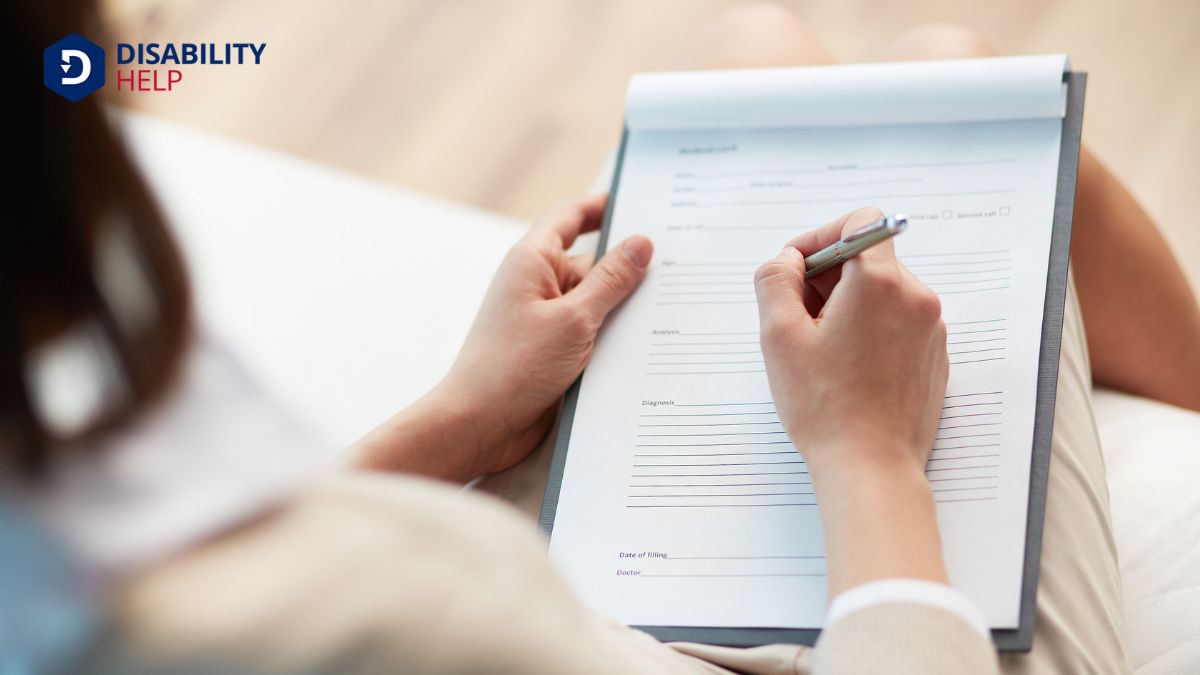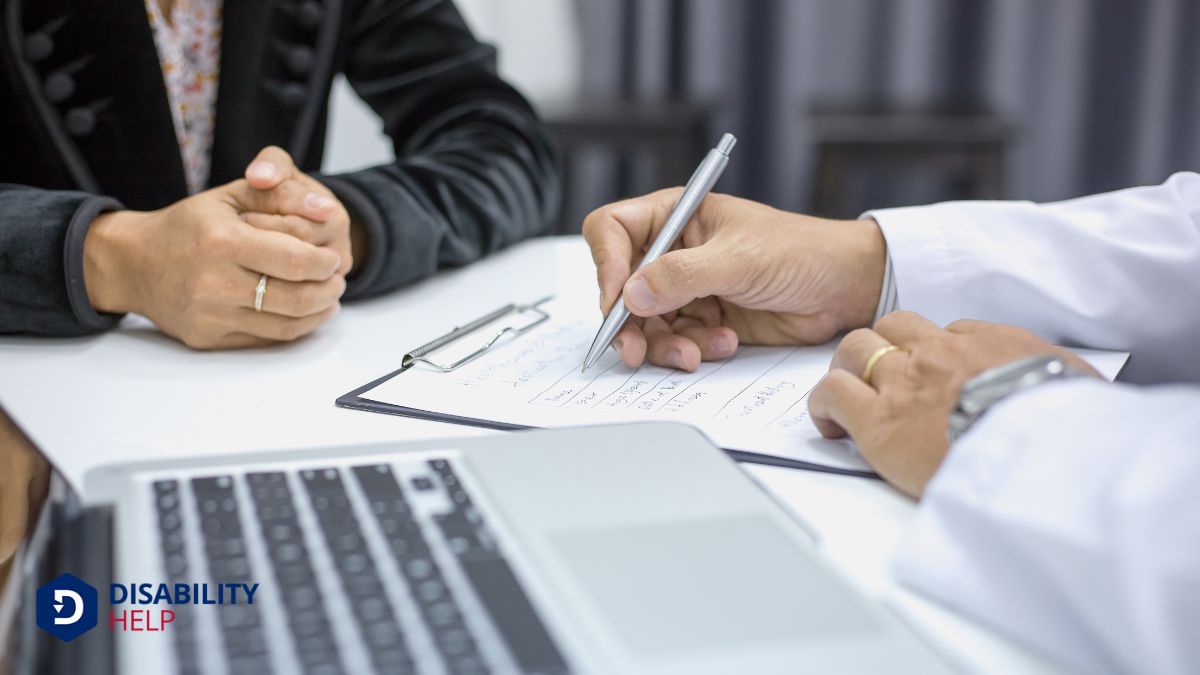Applying for Social Security Disability can be overwhelming, but we've got ten key tips to help. First, understand if you meet the eligibility requirements and gather all necessary medical records. Have a detailed conversation with your doctor and secure their support. It's essential to complete the application accurately and provide a detailed work history. Always keep copies of submitted documents and be truthful and consistent throughout. If you encounter a denial, prepare thoroughly for appeals, and contemplate seeking professional help to guide you. There's a lot more to ponder to make the process smoother and boost your chances of approval.
Key Takeaways
- Gather and organize all relevant medical records chronologically, including hospital visits and treatment plans, to support your disability claim.
- Ensure your doctor provides detailed documentation and written statements about your medical condition and its impact on your ability to work.
- Complete the application accurately, providing truthful and thorough answers to all questions, and describe how your disability affects your daily life.
- Provide a detailed work history from the past 15 years, including job titles, duties, dates of employment, and explanations for any gaps.
- Mark important deadlines on a calendar and set reminders to ensure timely submission of all required documents and forms.
Understand Eligibility Requirements
When applying for Social Security Disability, the first step is to understand the eligibility requirements. We need to know if we meet the basic criteria before diving into the application process.
First, we must have a medical condition that greatly hinders our ability to work. This condition should be expected to last at least one year or result in death.
Next, we need to check our work history. Typically, we must have worked long enough and recently enough under Social Security. The Social Security Administration (SSA) uses work credits to determine this. Generally, we earn up to four credits per year, and the amount needed varies by age.
Additionally, our income plays a vital role. The SSA sets a limit on how much we can earn while still qualifying for disability benefitsFinancial assistance provided to individuals who are unable to work due to a disability, such as Soc.... If we're working and earning above this limit, we mightn't be considered disabled.
Gather Medical Records

Before delving into the application process, gathering all our medical records is crucial. These documents provide the concrete evidence needed to prove our disability and its impact on our daily lives. Medical records include hospital visits, treatment plans, prescriptions, diagnostic tests, and any other pertinent health information. The more detailed our records, the stronger our case will be.
We should start by reaching out to all our healthcare providers. This includes primary care physicians, specialists, and any other medical professionals we've seen. Request copies of our records and make sure they cover the entire period of our illness or injury.
It's also a good idea to organize these records chronologically, as this makes it easier for the Social Security Administration (SSA) to review our case.
Let's not forget to include mental health records if applicable. Conditions like depressionA mental health condition marked by persistent feelings of sadness and loss of interest. or anxiety can greatly impact our ability to work and should be documented. By gathering all relevant medical information, we're laying a solid foundation for our application. This thorough preparation can streamline the process and improve our chances of success. With our records in hand, we're ready to move forward confidently.
Obtain Doctor's Support
Securing our doctor's backing is a vital step in the Social Security Disability application process. Our doctor's endorsement can greatly enhance our case, providing the medical evidence we need to demonstrate our inability to work.
First, we should have an open and honest conversation with our doctor about our condition and its impact on our daily life. By doing this, we make sure they fully understand our limitations and can accurately convey this information in their medical reports.
Next, we should ask our doctor to provide detailed documentation, including medical records, test results, and a written statement outlining our diagnosis, treatment planA detailed plan developed by healthcare professionals to treat a specific health condition, outlinin..., and how our condition impairs our ability to work. This thorough documentation helps the Social Security Administration (SSA) see a clear picture of our health situation.
It's also advantageous to request our doctor fill out any necessary forms from the SSA, such as the Residual Functional Capacity (RFC) form, which describes what we can still do despite our condition. Having our doctor's insight on these forms adds credibility to our application.
Complete Application Accurately
After gaining our doctor's support, we need to focus on completing the application accurately. This guarantees we provide the Social Security Administration (SSA) with the best possible picture of our situation.
First, we should gather all necessary documents, such as medical records, test results, and treatment histories. These documents help substantiate our claims and make our case stronger.
Next, we must answer every question on the application thoroughly and truthfully. Leaving any section blank or incomplete can cause delays or even lead to a denial. It's vital to be honest about our condition and its impact on our daily life. Exaggerations and omissions can harm our credibility.
Pay special attention to the sections that ask about our medical condition. Clearly describe how our disability affects our ability to work and perform daily tasks. Use specific examples from our daily life to illustrate the severity of our condition.
Include Detailed Work History
Detailing our work history is important when applying for Social Security Disability benefits. It helps the Social Security Administration (SSA) understand the nature of our past employment and how our disability impacts our ability to work. We should include every job we've had over the past 15 years, detailing job titles, duties, and dates of employment.
Let's not forget to mention specific tasks and responsibilities. This information paints a clear picture of what our job entailed and how our disability now prevents us from performing those tasks. Including information about the mental and physical demands of each role is vital.
For example, if our job required heavy lifting, standingThe legal right to bring a lawsuit, which requires that the individual bringing the suit has a direc... for long periods, or complex problem-solving, we should note that.
We should also provide contact information for our employers. The SSA may use this to verify details if needed. Finally, it's important to explain any gaps in employment.
Whether it was due to health issues, caregiving, or other reasons, clarifying these gaps helps the SSA see the full scope of our work history.
Meet Application Deadlines

Meeting application deadlines is vital when applying for Social Security Disability benefits. Deadlines guarantee that our application process moves smoothly and that we don't miss out on benefits we might be eligible for.
The Social Security Administration (SSA) sets specific time limits for submitting forms, medical records, and other documents. If we miss these deadlines, our application could be delayed or even denied.
To stay on track, it's important to mark all important dates on our calendar as soon as we start the application process. This includes deadlines for initial applications, appeals, and any additional documentation requested by the SSA. Setting reminders can be a big help in making sure we don't overlook any critical dates.
We should also consider gathering all necessary information and documents well in advance. This preparation helps us avoid last-minute scrambles that can lead to missing a deadline.
If we're working with an attorney or advocate, they can help keep us on schedule by providing reminders and assisting with timely submissions.
Keep Copies of Documents
When applying for Social Security Disability, we must organize all important paperwork and keep backups of our digital files. This guarantees we can quickly access any needed documents throughout the process.
Let's explore how maintaining copies can make our application smoother.
Organize Important Paperwork
Keeping your essential paperwork organized is important when applying for Social Security Disability. We can't emphasize enough how significant it's to maintain a clear and systematic approach to handling your documents. Start by gathering all necessary forms, medical records, and any correspondence related to your disability. Create a dedicated folder or binder where you can easily access these papers.
Label each section within your folder clearly. For instance, have separate sections for medical records, employment history, and correspondence from the Social Security Administration. This way, when you need to find a specific document, you won't waste time searching through piles of paper.
We also recommend keeping a checklist of all required documents. As you collect each item, check it off your list. This assures you don't miss any important paperwork that could delay your application.
Additionally, make copies of every document you submit. This helps in case anything gets lost or if you need to refer back to it later.
An organized approach not only keeps you on track but also helps reduce stress. By maintaining order, we're more likely to present a complete and accurate application, enhancing our chances of approval.
Backup Digital Files
Backing up our digital files is an important step in the application process for Social Security Disability. When we gather all the necessary documents, it's vital to keep digital copies. This guarantees we've access to our information even if physical copies are lost or damaged.
First, let's scan or photograph each document, including medical records, identification, and work history. We can use a scanner or even a smartphone for this task.
Next, we should save these files in a secure location. Cloud storage services like Google Drive, Dropbox, or iCloud are excellent options because they allow us to access our documents from anywhere with an internet connection.
Additionally, we should organize these files into clearly labeled folders. For instance, creating separate folders for medical records, personal identification, and employment history can make retrieval easier when we need it.
It's also wise to make backups on an external hard drive or USB stick, providing an extra layer of security.
Be Honest and Consistent
Honesty and consistency are important when applying for Social Security Disability benefits. We must provide accurate and complete information throughout the application process. If we exaggerate or omit details, it can harm our credibility and lead to delays or denials.
Consistency in our statements is also vital. Any discrepancies between what we tell different officials or write in various forms can raise red flags.
Let's make sure our medical records align with what we state in the application. If we tell our doctor one thing and the Social Security Administration (SSA) another, it could cause confusion. Keeping our story straight helps us avoid unnecessary complications.
It's also wise to keep copies of everything we submit. This way, we can reference our past statements to maintain uniformity in our narrative.
Prepare for Appeals
Finding one's way through the Social Security Disability process can be challenging, and many of us may find our initial applications denied. But don't get discouraged. If our application is denied, we have the right to appeal. Let's understand the steps for a successful appeal.
First, we need to act quickly. We typically have 60 days from the date of the denial notice to file an appeal. Gathering all necessary documents is vital. These include medical records, doctor's notes, and any new evidence that supports our case. Keeping everything organized will make the process smoother.
Next, we should carefully review the denial letter. It will outline specific reasons for the denial. Understanding these reasons helps us address any issues in our appeal. When we write our appeal, we need to be clear and concise, directly addressing the points raised in the denial letter.
It's also important to stay persistent. The appeals process can be lengthy, but staying determined can make a significant difference. Remember, many applicants are successful on appeal. By being thorough and proactive, we increase our chances of receiving the benefits we need.
Seek Professional Help

When applying for Social Security Disability, seeking professional help can make a huge difference. By finding experienced attorneys, we can better understand the legal requirements and maximize our chances of approval. Let's explore how professional guidance can support us through this complex process.
Find Experienced Attorneys
Exploring the complexities of Social Security Disability applications can be overwhelming, but finding experienced lawyers can make a world of difference. When we take this important step, we gain access to professionals who understand the system inside and out. They know the best way to present our case and can greatly improve our chances of approval.
First, we should look for lawyers who specialize in Social Security Disability cases. Their expertise means they're familiar with the specific requirements and common pitfalls. It's crucial to check their track record. Have they successfully helped clients like us before? Positive testimonials and a history of winning cases are good indicators of their proficiency.
Additionally, experienced lawyers can help us gather the necessary medical evidence and documentation. They'll make sure that everything is in order and submitted on time. This level of organization can prevent delays and reduce stress on our end.
Let's also consider the cost. Most Social Security Disability lawyers work on a contingency fee basis, which means they only get paid if we win our case. This arrangement can make professional legal help more accessible for us.
Understand Legal Requirements
Exploring the legal maze of Social Security Disability can be daunting without understanding the specific requirements. We need to be aware of the legal criteria to navigate this process efficiently. Seeking professional help can make all the difference. Let's break down what we should focus on:
- Eligibility Criteria: We need to make sure that our condition meets the Social Security Administration's (SSA) definition of disability.
- Work Credits: It's crucial to understand how many work credits we've accumulated, as these can impact our eligibility.
- Medical Evidence: Proper documentation from healthcare providers is vital. The more detailed, the better our chances.
- Application Deadlines: Missing deadlines can derail our application. We need to be vigilant about submission dates.
- Appeals Process: If our initial application is denied, knowing how to navigate the appeals process is essential.
Understanding these components helps us prepare a thorough application. Seeking advice from legal professionals who specialize in Social Security Disability can provide invaluable guidance. They can assist us in gathering the necessary documentation and ensure that we meet all legal requirements. By taking these steps, we increase our chances of a successful application and lessen the stress of this complex process.
Maximize Approval Chances
Having a solid understanding of the legal requirements is just the beginning. To truly maximize our chances of approval, seeking professional assistance can make a significant difference.
Navigating the Social Security Disability application process is complex and often overwhelming. With a professional, we're guided through each step, ensuring no vital details are overlooked.
Professional advocates and attorneys specialize in disability claims, possessing in-depth knowledge of what the Social Security Administration (SSA) looks for. They help us gather the necessary medical evidence, craft persuasive narratives about our conditions, and meet all deadlines. This expertise can be the key to transforming a potentially shaky application into a compelling case.
Additionally, professionals can represent us during hearings, speaking on our behalf and addressing any questions the judge might have. This representationThe way people with disabilities are depicted in media, culture, and politics, often influencing pub... can tilt the scales in our favor, especially when we're dealing with complicated medical histories or previous denials.
While there may be costs involved, many disability attorneys work on a contingency basis, only getting paid if we win our case. This arrangement makes professional assistance accessible to those of us who need it most. In the end, investing in expert help can be the crucial step that leads to a successful disability claim.
Frequently Asked Questions
How Long Does the Social Security Disability Application Process Typically Take?
We should expect the Social Security disability application process to take about three to five months. However, it can vary depending on the complexity of the case and the need for additional medical evidence.
Can I Work Part-Time While Applying for Social Security Disability Benefits?
Yes, we can work part-time while applying for Social Security disability benefits. However, we must make sure our earnings don't exceed the substantial gainful activity limit, or it might impact our eligibility. It's important to stay informed and cautious.
Are Social Security Disability Benefits Taxable?
Yes, Social Security disability benefits can be taxable. If our total income, including half of our benefits, exceeds certain limits, we'll need to pay federal income tax on a portion of those benefits.
What Should I Do if My Financial Situation Worsens During the Application Process?
If our financial situation worsens during the application process, we should inform the Social Security office immediately. They might expedite our case or provide additional resources to help us manage until a decision is made.
How Does Social Security Define a "Disability"?
Social Security defines a "disability" as a condition that prevents us from working and is expected to last at least one year or result in death. It must greatly impair our ability to perform basic work activities.
Conclusion
To sum up, applying for Social Security Disability can be a complex process, but we've got this covered together. By understanding eligibility, gathering medical records, getting your doctor's support, and completing the application accurately, you'll be on the right track. Don't forget to include detailed work history, keep copies of everything, and always be honest and consistent. If needed, prepare for appeals and seek professional help. Let's tackle this step by step and boost your chances of success.






